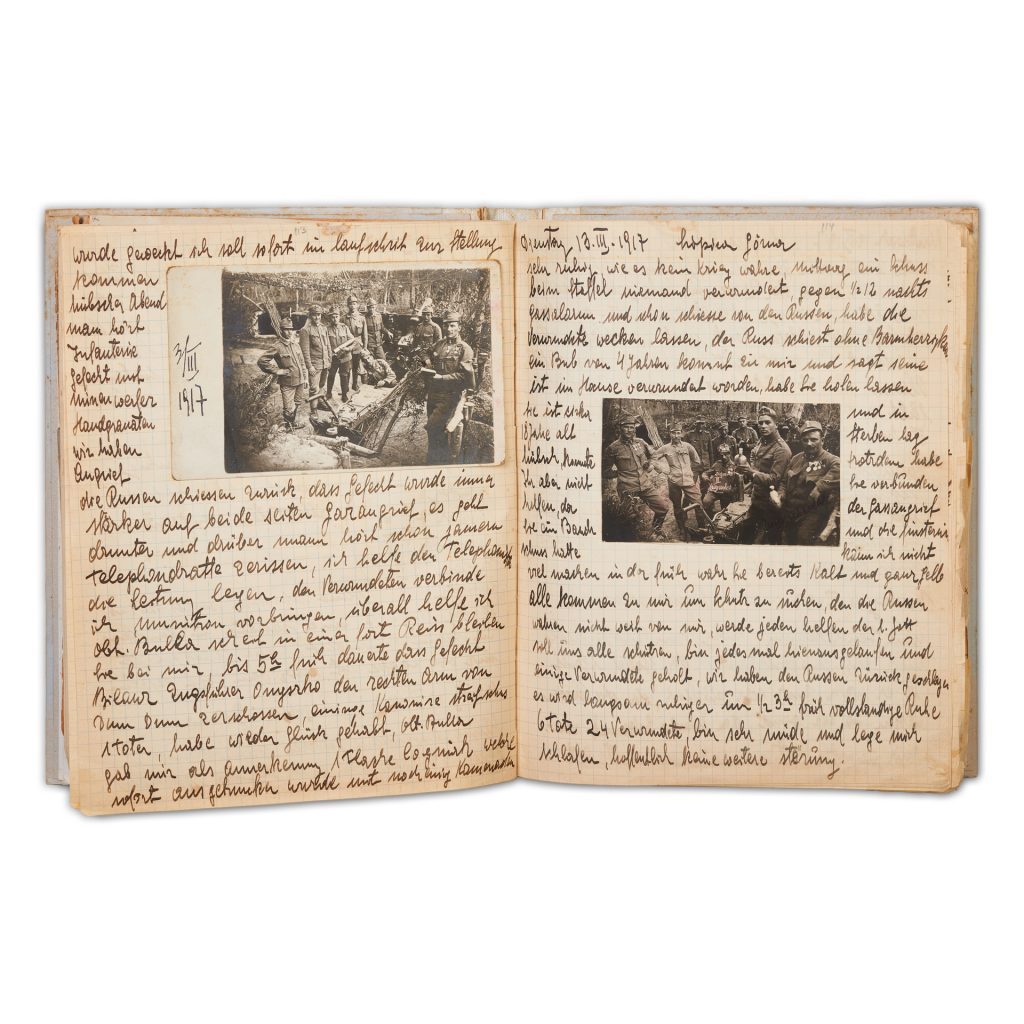Diary of Teofil Reiss
Austria, 1914-1918
Ink of paper, gelatin silver print
Courtesy of Tuvia Erez (Reiss)
Reiss was a Jewish soldier and Austrian patriot who served as a gunner in Emperor Franz Joseph’s army during World War I. His diaries describe everyday life on the Front along with photos of his fellow soldiers. Reiss was an esteemed soldier awarded honors for his bravery. During World War II he fled to Uzbekistan, where he died from typhus.
On 22 November 1916 he wrote: Emperor Franz Joseph has died. A day of mourning. Also in the city. Especially the Jews are crying. In the Synagogue, Tisha B’Av. In the afternoon we pledged our alliance to Emperor Karl.
Must Know
This is the diary of Teofil Tobias (Tuvia) Reiss, a young Jewish Viennese and Austrian patriot, which outlines his daily experiences as a medic in the Austro-Hungarian Imperial Army (under Franz Joseph and later Charles I). Reiss was born in 1889 to a Jewish family with 17 children in Lvov (also known as Lviv), part of the Austro-Hungarian Empire. he moved to Vienna to study and was there until he was drafted into the army. His son Isaac took the diary when he fled Austria in 1938 after its occupation by the Nazis. Isaac managed to immigrate to Israel illegally and kept the diary with him in his family home in Israel. In the book, each page has the original manuscript on one side and the english translation on the opposite page. The diary also details Reiss’ post-war experiences under Nazi rule until his death in 1942.
In the First World War, many Jews fought on both sides. In both the German and Austro-Hungarian Empire armies, Jews actively participated in the war and the percentage of Jews in the army was significantly higher than their percentage of the population. Although Jews took up service in the army as a way of proving their loyalty to their country, they were perceived to be dodging military positions and thus the subsequent defeat in the war was blamed on them. In 1916 a commander in the German army was appointed to investigate the percentage of Jews serving. The census results have never been published. However the impression of “being stabbed in the back”, the notion Germany was defeated because of the Jews and the Communists, was already ingrained in German minds. Many soldiers who served in the national armies, as well as the sons of soldiers and veterans with war medals and decorations, were denounced by the Nuremberg Laws. During the Second World War, they were deported to ghettos and concentration camps and exterminated without mention of, or reference to, their military service in World War I.
More Info
During the First World War, the Jews serving in the armies of the Central Powers retained their Jewishness. They ate kosher food, kept up the holidays, received prayer arrangements and received help from Jewish military rabbis. There are records documenting the life of Jewish soldiers serving in the army and of their encounters with Eastern European culture, like Poland for example. The differences in clothing, education and economic class influenced the young soldiers, and they expressed considerable wonder and amazement at such differences in the letters and diaries written during their military service. Additional information was documented in a book written by Dr. Felix Theilhaber who enlisted in the German army after completing his medical studies in Berlin and Munich and who served in numerous military hospitals. he wrote about the experiences of Jewish fighter pilots in the German air force, a division considered to be modern and prestigious. One of the Jewish pilots whose story is detailed in the book was the pilot Fritz Beckhardt who received medals of honour from the German army and served in the same squadron as hermann Göring (Nazi commander-in-chief of the German air force in the Second World War). The symbol of the squadron was the swastika which featured on all of the planes in the squadron – including Beckhardt’s plane. The book was written with the aim of showing the dedication of Jewish fighters for the German cause, following the antisemitism which Theilhaber experienced whilst serving in the German army. he left for Israel in 1925 after his medical license was revoked because of his Jewish origin. In Israel he, along with a group of other doctors, established the Maccabi healthcare Service.

